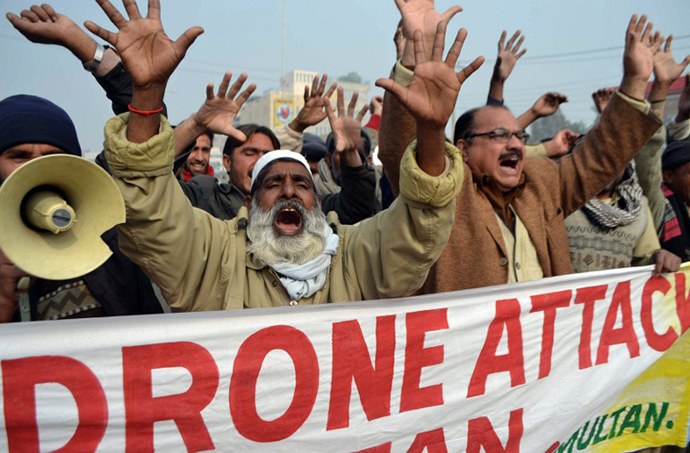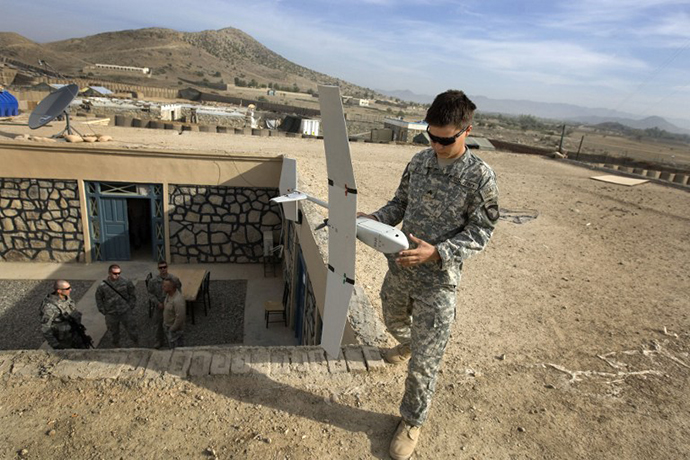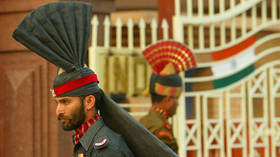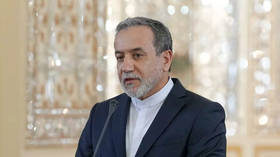'Drone strikes in Pakistan completely negate the right to life'
When President Obama tells people that drones are more humane weapons, he tries to be a good salesman for the weapon, but forgets that it’s a weapon which kills, Shahzad Akbar, a human rights lawyer representing drone victims, told RT.
Shahzad Akbar, Director of the Foundation for Fundamental Rights, and a member of the British human rights organization Reprieve, is a human rights lawyer representing drone victims in a criminal case against US officials.
The interview comes as Pakistan voted on Wednesday in favor of Nawaz Sharif, who begins an unprecedented third term as Prime Minister of this country of 180 million people.

In an address to parliament after he was elected, Sharif
specifically called for an end to the drone attacks used by the
United States to target terrorists in the tribal areas bordering
Afghanistan to the north.
"This daily routine of drone attacks, this chapter shall now
be closed," Sharif said to enthusiastic applause. "We do
respect others' sovereignty. It is mandatory on others that they
respect our sovereignty."
RT:Thank you so much for taking the time to speak with
us. How would you describe the fundamental issue with the US
drone program as you see it?
Shahzad Akbar: the fundamental problem with drone strikes in Pakistan is that it’s completely negating the right to life of citizens of Pakistan and that’s the basis of our whole campaign against drones. The other issue is violation of security, or not having a proper legal mechanism behind the drone strikes in Pakistan; for me it’s all subsidiary issues, the main issue here is that it’s negating the right to life to people of Pakistan, it’s negating due process, it’s negating everything, which civilized society offers, a democratic society offers to its citizens. So it’s against the law and this is taking lives, and it’s not just taking militant or terrorists’ lives, it’s taking civilians, young children, women, elderly and other civilians’ lives as well.
RT:Drones have been touted as a more humane form of warfare and some supporters have said that its more preferable to have a few targeted strikes as opposed to troops on the ground fighting a traditional war.
SA: I think when President Obama tells people that drones are more humane weapons, I think he’s just trying to be a good salesman for a weapon, at the end of the day, it’s a weapon which kills. So if you kill people in a humane way or inhumane way, the basic fundamental thing that you are doing here is killing. And if that killing is illegal without the due process, then that’s what’s wrong with it. It’s not about the weapon, it’s not about the machinery, it’s about the very thing what you do and that is killing. So if you are killing people without due process, without any law behind you, then you are committing a crime.
RT:President Obama has stated that drones “have not caused a huge number of civilian casualties”, he said that for the most part these have been “precise…”, and the program targets “are active terrorists”. How do you respond to his assessment?
SA: President Obama often says that it only kills militant and doesn’t kill civilians, but yet he fails to give their names and identities of those who’ve been killed in these strikes in Pakistan. Now according to independent sources more than 3 thousand people have been killed in Waziristan in Pakistan, but not a single name has been given by President Obama or the CIA, which is carrying out all these strikes. What we hear from news reports is just a few names of militant leaders who’ve been killed and rest is all a guess.
So if President Obama is still sure that he is killing militants
and he has not killed any civilians, then he has to give names
and details of all those militants who he has killed, because for
as a Pakistani I would be happy in a sense, that if you have
killed all those people who are creating all this terror in my
cities. If you’ve killed all these people, ok I let you go
probably for your violation of law, but at least I will be happy
that you are making me safe. But the question here is who are you
killing? You have no idea yourself, and this is what the recent
reports published in American media tell us, that US has no idea,
CIA has no idea who they are actually killing in these drone
strikes.

RT:How can anyone know who is actually getting killed in these drone strikes?
SA: Isn’t it the CIA who should be knowing who they are killing because CIA, when they say it’s very precise and it’s very accurate, so what it this precision and accuracy if you don’t know who you are killing?
RT:Most of the drone strikes take place in remote areas, known as tribal areas, which are effectively blocked by Pakistani authorities from the rest of the world. Can you describe a little bit the conditions in these areas?
SA: Well, most of the drone strikes in Pakistan, which the number is more than 370 drone strikes so far, and they have been taking place in the tribal areas of Pakistan and specifically in two regions, one is South Waziristan and the second is North Waziristan. And these areas, one is an operational military area, and the other area has a huge contingent of Pakistani military in that area, which has been blocked from the rest of the country. The whole border between Pakistan from North Waziristan to Afghanistan is also pretty much manned. According to the recent number, which they have given to a UN representative, in Pakistan that number is more than 100,000 soldiers in Waziristan, so this is the kind of area, where President Obama, says this is the place I'm hitting where the Pakistani Army or no one can reach. So there is a reach, but this reach is by the Pakistani military, and no one else. So, for example, independent journalists like you or campaigner like me, or a lawyer like me cannot go to that area. And similarly if anyone wants to come out of this area to report of any violation, it's extremely difficult for that person to come here because, just to give you an example, to get out of Miranshah, which is the capital of North Waziristan, to get out of that into a settled area, there is a road, which is not more than 30 to 40 kilometers, and you have to cross 7 military checkpoints. Where pretty much at every checkpoint you are stripped, and if you don't have an ID saying that you are from the tribal area, you are not allowed in or out.
Some people might not like it, but I simply call it a concentration camp, that you've built a wall of military and militants, and behind this wall you are keeping more than 800 thousand people who are not allowed to come out and no one from the rest of the country is allowed to go in. And that is kind of laboratory that US is using to use test its drone program.
RT:How do you establish innocence of your client?
SA: Interestingly, I don’t have to prove their innocence
in the court of law, because in court of law you have this
principle that presumption of innocence, everyone is innocent
until proven guilty. It’s just a court of public perception when
I go out there with my clients. First question people ask me, how
would you prove them to be innocent? And my answer to them is,
how would you prove them to be guilty so that you kill them? Do
you have anything against my client to say that they are
militants; they are family members of militants, with a person
who has been killed was a militant, so therefore that person was
killed. There is not even an allegation of that present here. So
there is not even an allegation of that, so how do I prove my
client’s innocence is not really my job, but I think they have
proven their innocence by travelling from Waziristan, crossing
all those dozens of checkpoints by military, coming to Islamabad
and Peshawar filing their cases in the High Court, speaking with
journalists, speaking with the rest of the world and telling
their story. And on the other side what we have is utter silence.
CIA is saying nothing, they are not even getting my clients’
claims, so who do you believe here?

RT:And how do you define a militant in this case, Ive read statements stating that the US claims any able bodied male from a certain age group is a potentially a militant.
SA: I think there are two things here. One is, first of
all, there is no definition of who is a militant and who is not a
militant, just like there is no definition so far for a
terrorist. If you don’t have so far a proper definition of
terrorist.. The problem here is in Waziristan that what we are
talking about here is the signature strikes. Now this is kind of
methodology that has been developed by the CIA that they are
going to study the behavior of a person and the way someone is
dressed or is looking. And then on the basis of that they draw
this assumption that this person might be a militant we are
looking for. And that just this whole process simply explains to
you the absurdity of this process and selecting a target. So, for
example, according to, again, once again, the documents leaked by
the CIA or of the CIA and printed and published in American
journals or newspapers indicate that a signature is where a CIA
operative is looking at the screen, studies the person's
behavior. For example if there is a guy who has a long beard,
wears certain kind of turban, carries a gun, drives in a SUV is
your militant, and this is the basis of the CIA’s labeling anyone
as a militant and then taking a target and killing them. And this
is what we used to have in the United States in the 60s - racial
profiling. If you are a black guy and you are walking in a white
neighborhood and all the police was supposed to stop and search
you because you are a black guy, you are supposed to be a thief.
So the question for Americans is: is this what you would like to
be known for? Or are your principles important which your four
fathers fought for centuries and built those principles within
your own country?
RT:US Assistant Secretary of Defence Michael Sheehan told the Senate Armed Services Committee that there is no time limit or geographical boundary on drone strikes. He said that military operations against Al-Qaeda would last beyond the present term of President Obama “10 to 20 years.” That would mean that the drone strikes would continue till 2024, or even up to 2034....what's your response?
SA: I think the US administration is not really listening
to reason here because all governments around the world, UN,
people on the ground are telling them that this is a disastrous
program, and you have to listen to reason, you have to listen to
all those hundreds of cases of innocent civilians who have been
killed in Pakistan, in Waziristan by drones and hundreds of
civilians who have been killed even in Afghanistan, where your
forces even have the ground control, and still you are committing
so many mistakes, you are killing civilians. Just to give you one
example, in 2010 US military killed its own soldier, who was on
ground, with a drone. So they were American soldiers dressed as
locals on some kind of operation, and they’ve been killed by
drones themselves. One thing, which the American administration
needs to understand, is that drone technology is not a very
sophisticated or complicated technology; and what if in future
countries have drones, what will be the impact of the precedence
that US is setting on the world.
RT:You almost make it seem like there’s unanimous international opposition to the use of drones but if drones per-se were so bad, why would Pakistani officials ask for the technology?
SA: I would ask a question that what role the Pakistani
Army or Pakistani Government is playing in drone wars. Because on
one side they are saying that drones are illegal and
counter-productive, but on the other side we also hear that they
have been cooperating on drone wars in Pakistan. And this is the
key question that we have been asking through our litigation and
this is the thing, which has been settled in Peshawar High Court,
litigation, which we recently succeeded in. And court held
categorically that drone strikes are illegal and Pakistani
government submitted their reply in the court saying that they
are not cooperating and that they will not cooperate in the
future, there is no consent on drone strikes. So therefore the
court gave a very categorical order to the government of Pakistan
to tell Americans that there will be no more drone strikes in
Pakistan, and if there are, there will be consequences for rulers
ass well.
RT:What are the prospects of this actually happening?
SA: I think there are good prospects… I think this judgment of Peshawar high court provides that tool for Prime Minister Nawaz Sharif to take up the case of drones with the Americans and settle it, now it’s for the Americans to listen to reason. And if they don’t, then I’m not sure what options the Prime Minister has left because we’ve had a Prime Minister in the recent past who’s been sent home by a court of law for not obeying the decision of the court. So then the Prime Minister should be running the risk of being sent home. This is exactly what we’ll be doing if drone strikes continue and the Prime Minister doesn’t do much on drones. If he doesn’t tell the Americans to stop it, he doesn’t order the Pakistani military to shoot it down. Then we have another option, but to go to court for the contempt of court against him.
RT:But is Pakistan in the position to be able to be able to challenge the United States on the drone program?
SA: Why not? I mean, Pakistan has not always been
listening to the United States. For example, just to give you an
example of Nawaz Sharif’s previous 10 years as Prime Minister
when Pakistanis wanted to nuclear test despite America’s
pressure. Prime Minister Nawaz Sharif at that time went ahead
with it and at this time if a Pakistani Prime minister really
wants to stop the drone strikes, it’s not really hard to shoot it
down. And Pakistan withdrawing its cooperation from war on
terror, I don’t think US will have much option here.
The statements, views and opinions expressed in this column are solely those of the author and do not necessarily represent those of RT.












